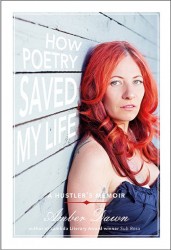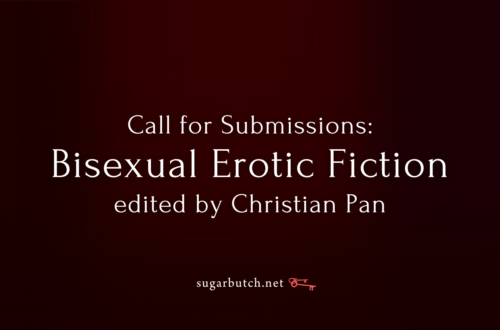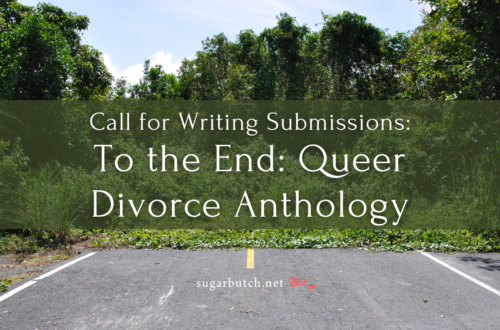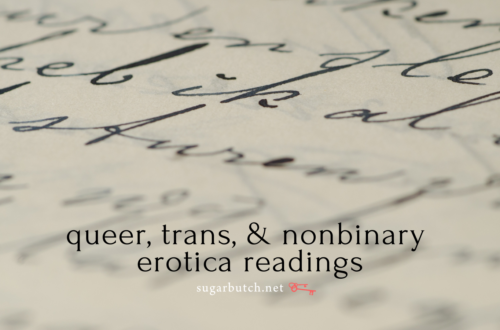This site contains explicit writings on kink practices, dominant/submissive relationships, and queer kink erotica (among other things). All characters in role play or non-consent scenes are consenting adults. Content warnings are included.
 I published a note about me & Amber Dawn reading some poetry this week earlier today, but I forgot that I have this lovely little interview from Amber Dawn’s publisher, Arsenal Pulp Press.
I published a note about me & Amber Dawn reading some poetry this week earlier today, but I forgot that I have this lovely little interview from Amber Dawn’s publisher, Arsenal Pulp Press.
Interview with Amber Dawn
Q: The format of How Poetry Saved My Life (prose pieces mixed with a variety of poetry forms) deviates from what readers might have come to expect from the literary memoir form. Sections “Outside,” “Inside” and “Inwards” hint at a narrative arc, though the overall structure remains more loose and thematic than chronological. Why did you choose to tell your story this way?
Amber Dawn: I have a great deal of admiration for authors—especially ex-sex workers—who write their memoir as a chronological journey. Some books I’ve had the pleasure of reading recently are Whip Smart, by Melissa Febos and Candy Girl: A Year in the Life of an Unlikely Stripper, by Diablo Cody. I doubt I’d have the wherewithal to sit down and write my own story in this manner. How Poetry Saved My Life encompasses nearly fifteen years of collected writing. I wrote each piece for different reasons. Some poems had more therapeutic or cathartic beginnings, harken to the book’s title. Some prose I wrote to present at sex worker conferences or forums. It took a while before I realized I had an entire book’s worth of writing, and a bit longer still before I felt brave enough to release these collected stories and poems publicly. I view the account of my experiences as more of an emotional journey, rather than a chronological one. Through this approach I hope readers will make there own personal connection to the book, even if they’re life experiences are different from my own.
Q: The book represents nearly fifteen years of collected writings. You’ve had a very diverse writing career—you’ve edited horror and porn anthologies and dipped into the magical realist genre with your first novel Sub Rosa. How did you come to write a non-fictionalized memoir?
A: I believe a voice is a powerful and privileged resource to possess, especially when it comes to something like sex work, which is constantly silenced and stigmatized. Through performing on both small and larger stages, I’ve found that in every audience there is at least one woman (or man) who not only relates to my story, but feels almost desperate to have silence around sex work and survivorship broken. I feel a duty to speak up.
Q: Is there a piece of prose or poetry in the collection that was particularly difficult for you to write or realize, and in turn share with readers?
A: “Lying is the Work” is a personal essay that juxtaposes a bad date I had during the last year of working in the sex trade with my grandfather’s story of joining the Navy at age 17 to fight in WW2. This is one of very few examples where I bring my family history into my work. I love my family and want to protect and spare them of triggers or “digging up dirt.” While I’m proud of who I am, I acutely understand that survivors and sex workers are stigmatized and that this stigma can impact families and loved ones.
Case in point, recently, my grandfather disowned me when I married my wife—a ceremony that everyone in my family attended but for him. Therefore, I feel I can tell a bit of the story between my grandfather and I—in a dignified and objective way—without worrying about him reading it. As an Italian-American immigrant and Navy veteran he has a tremendous story of survival. It’s bitter sweet that I relate to him as a survivor and yet we have no present-day relationship. This makes the personal essay very difficult for me.
Q: RADAR Productions recently awarded you the 2012 Eli Coppola Memorial Poetry Chapbook Prize for “How I got My Tattoo.” How does the title poem of that particular collection fit into your personal narrative in How Poetry Saved My Life?
A: What an honour to win the Eli Coppola Memorial Poetry Prize, and just before I launch How Poetry Saved My Life! I have a quite a few titles like How Poetry Saved My Life and “How I Got My Tattoo” that are posed like answers to questions. Sex workers and survivors get asked questions all the time. I could over-simplify all these questions to essentially, “How did this happen to you.” I hate that question—the question implies that being a survivor or being a sex worker is outside the norm and needs explanation—when in fact these experiences are very common. Nonetheless, I also sympathize that people need to ask questions and discuss. The titles that I’ve written as answers to questions are there to promote discussion in a proud and creative way.
Q: In the book you cite author Jeanette Winterson and “powerful women whose voices have been cut short” among your inspirations. Would you tell us more about how you have been influenced by literary and activist voices in your life?
A: I was in my teens and early 20s in the 1990s, and was gobsmacked by the Riot Grrl movement. My first serious girlfriend introduced me to the feminist music and zine culture and listing to Team Dresh and Bikini Kill gave me the idea that I too had something to say. Not only where these voices powerful, but they were accessible. I didn’t need education to understand the feminist politicking of Riot Grrl. But after being introduced to feminist art and literature, I wanted to learn more. This was probably the first time I ever wanted to learn or read anything. I began reading Jeanette Winterson, Beth Goobie, Larissa Lai, Evelyn Lau, Sharon Olds, Lucille Clifton, Michelle Tea, Sarah Schulman. Finally, I understood the comfort and solidarity that could be found through books.
Q: You’ve toured with the Sex Workers Art Show, created short films, as well as performed at a variety of venues including the Vancouver Art Gallery. How does your performance and film background compliment or deviate from your writing?
A: Performing at galleries or appearing in my own films has helped me get into my body. Like many survivors, I’m inclined to live in my head, my imagination is a real sanctuary. Performance art has allowed me to embody the themes and emotions of my work and connect more closely with audience. I really feel the work when I’m hurling my body around a stage. In turn, this has helped me sink into a deeper connectivity to my written work.
Q: You now teach creative writing classes—some to queer and at-risk youth. Can you say more about the potential of art to be a survival skill and lifeline to others?
A: Something very palpable occurs when a person writes their story. It doesn’t have to be for future publication, but simply to put memories on paper and/or to read them in a room full of safe, supportive listeners. It’s an investment in one’s self. It’s an act of acknowledging one’s worth. It’s making the unspoken, heard. This can have life-changing impacts on people who have been shut down or silenced. Each time I run a creative writing workshop I see a little bit of change happen. “Thank you for listening,” my students always say to me. They don’t need to thank me; they should thank themselves. They do transformative work when they use their voices.



